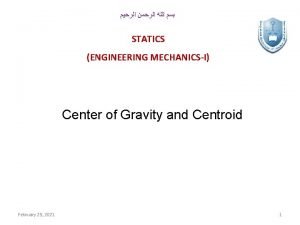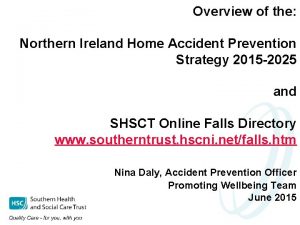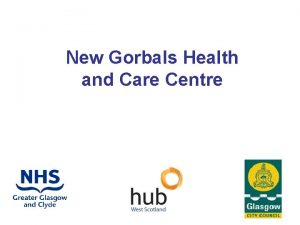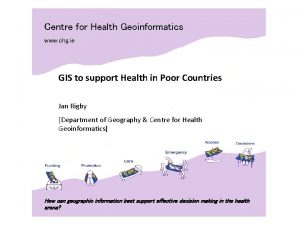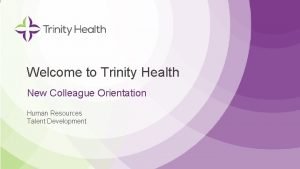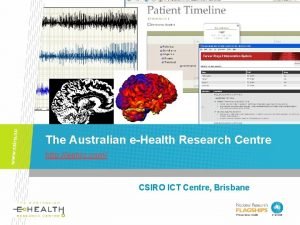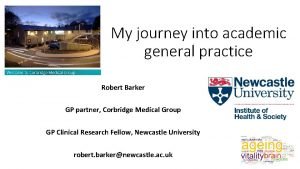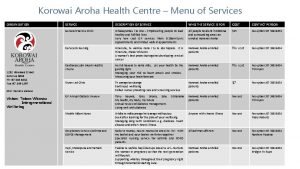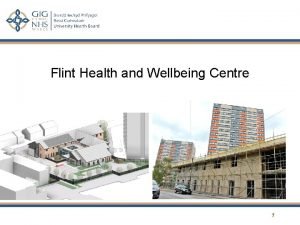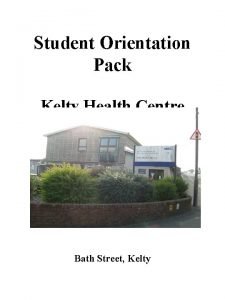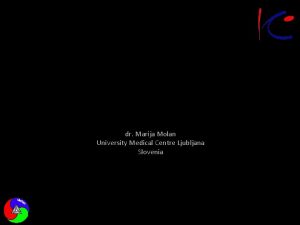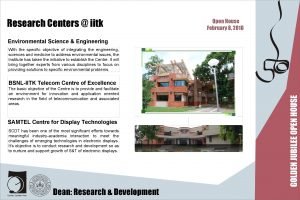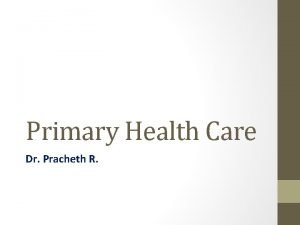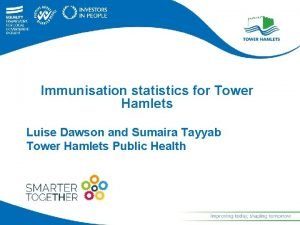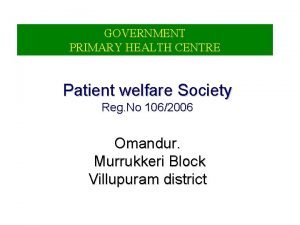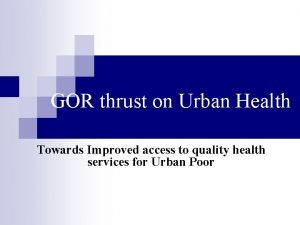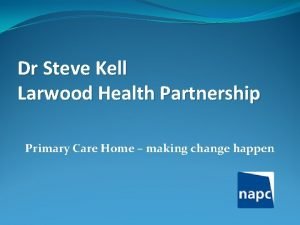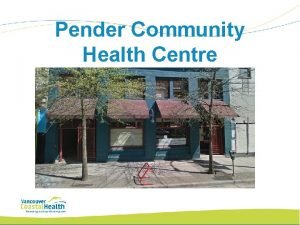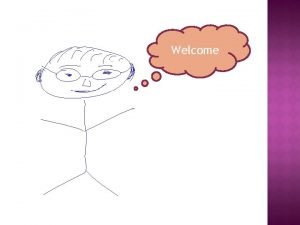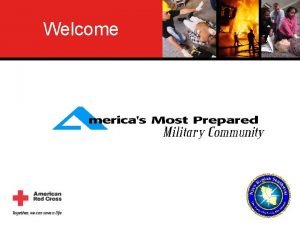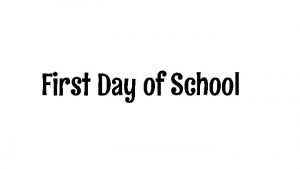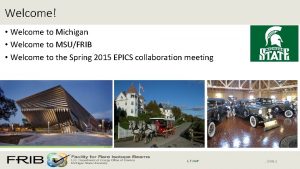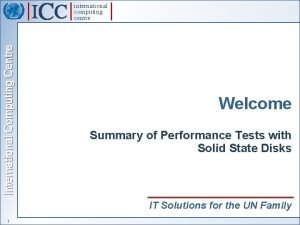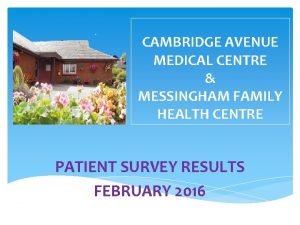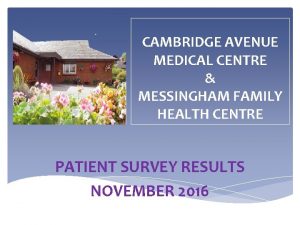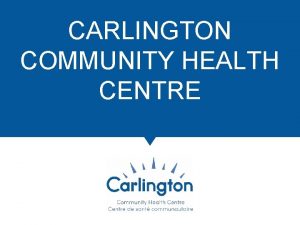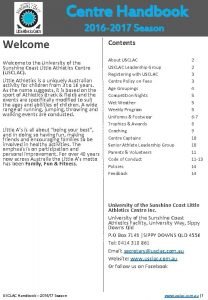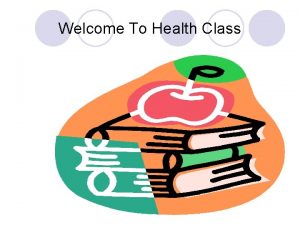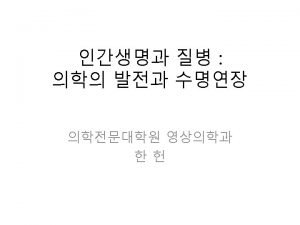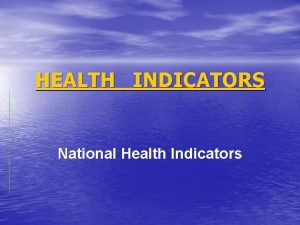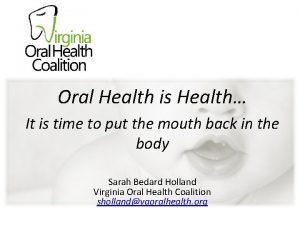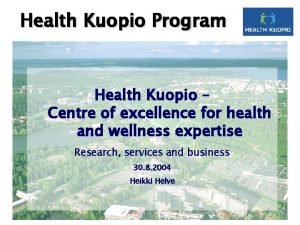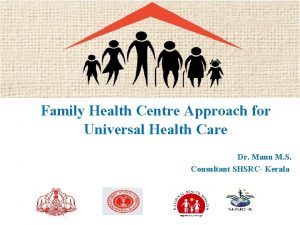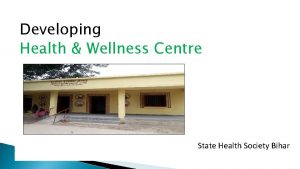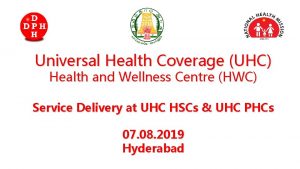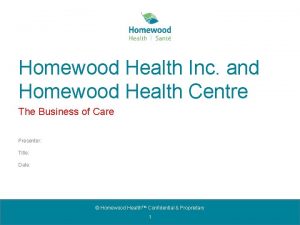Welcome to Mifumi Health Centre Mifumi Health Centre






















- Slides: 22

Welcome to Mifumi Health Centre

Mifumi Health Centre • Modern type IV clinic • Nursing Sister, Clinical Officer, Midwife, nursing aids and support staff • Provides comprehensive clinical and immunization services • Outpatients, lab, antenatal services • Mini theatre for minor/cold surgery • Exchange programmes with overseas students

Mifumi Advice Centre

Sr Goretti - Incharge

The Lab

Outpatients

Outpatients

Mifumi Health Centre Facilities • 8 flats for staff accommodation • Has electricity and water • Integration with the school, loans and domestic violence programmes • Computers

Situational Health Analysis : To assess the reproductive and sexual health needs of the population of Mifumi and to design and implement a reproductive health program in Mifumi. Conducted: 2002

Health Indicators Tororo District Population growth rate 4. 5% Fertility rate 6. 9% Dependency ratio 94. 1 per 100 Infant mortality (per 1000 live births) 98. 1 Child mortality (per 1000 pop) 86. 0 Maternal mortality (per 100, 000 births) 506 Life expectancy at birth in yrs 47

Situation Analysis - Findings • Lack of essential prenatal and delivery care and of referral facilities particularly obstetric and paediatric.

Situation Analysis - Findings • Lack of a health information source. • Helplessness towards the morbidity and mortality from AIDS and the related consequences, orphans and the of inheritance widows. • Unsafe and unwanted pregnancies among adolescents and the related abortions.

Situation Analysis - Findings • Poor access to family planning information and services. • Lack of access to information and care for cases of infertility and cancer.

Situation Analysis - Findings Age • Eighty percent (80%) of this population is aged from 21 to 50 years. • 1. 5% are Adolescents aged nineteen and less. • 8% are aged 60 years and above.

Situation Analysis - Findings Education • 70% of the population has received some formal education ranging from Primary 1 to Primary 4, but only 5% of women and 25% of men can read. • • National literacy rates are: - Male 47%; Female 28% Occupation: 70% peasant farmers

Situation Analysis - Findings Contraceptives & family planning • Contraceptive prevalence: 14%. • 53% think contraceptives are essential • 57% respondents can access the services within 10 km distance • 94% access family planning services • 50% respondents with `Nil education` think contraception is dangerous. • 5. 5% of respondents with Secondary School Education or more think contraception is dangerous.

Situation Analysis - Findings Marital union: 78% monogamous, 17% bigamous, 5% above. Antenatal: 96% of women, 5 -times per pregnancy Maternity: Only 30% have access to labour and delivery care by qualified staff

Situation Analysis - Findings Impact of formal education on Frequency of ANC attendance: • 60% mothers educated to secondary school and above attended ANC at least 5 times compared to 42. 5% of mothers with nil education. • Only 42% of mothers attending ANC had received education about Breast feeding. This “Tip of the iceberg” reflects a serious gap in Health Education quality during antenatal care.

Situation Analysis - Findings Access to Emergency Obstetric Care • 77% of respondents reported absence of access to emergency obstetric care which obviously has a direct impact on Maternal and Neonatal mortality and morbidity (Fig 13). • For this unfortunate majority therefore an obstetric emergency cannot be treated in safe time. • These mothers must travel at least 15 Km in order to access emergency obstetric care.

Situation Analysis - Findings Causes of Maternal / Neonatal and Infant Morbidity & Mortality: • Late reporting for medical attention is a common cause. Access to Essential Care for the new-born • 68% of respondents felt they had no access to essential care for the new born and a majority 34. 6% of those who could access had to travel at least 11 -15 km to the health unit. Thus, delay- related complications set in again as with the mothers in labour.

Situation Analysis - Findings Breastfeeding • 59% of female spouses had never been educated on breastfeeding or encouraged to practice it. • It is notable that 60. 8% of mothers have no easy access to postnatal care mainly owing to the distance from the source of service. The majority 81. 5% of mothers must travel 11 km or more in order to access it and 20% have to travel further (16 -20 Km) as they come from the other side of the village.

Way forward Poverty eradication to improve access to health services Mifumi Health Center for training and research Thus: COBES is welcome.
 Welcome welcome this is our christmas story
Welcome welcome this is our christmas story Chcagi
Chcagi Difference between centre of mass and centre of gravity
Difference between centre of mass and centre of gravity Centre of gravity formula
Centre of gravity formula Fall prevention interventions
Fall prevention interventions Gorbals dental practice
Gorbals dental practice Who gis centre for health
Who gis centre for health Trinity health centre
Trinity health centre Aehrc
Aehrc Corbridge health centre
Corbridge health centre Korowai aroha health centre
Korowai aroha health centre Flint health and wellbeing centre
Flint health and wellbeing centre Tuen mun mental health centre
Tuen mun mental health centre Kelty health centre
Kelty health centre Heaton moor health centre
Heaton moor health centre Ljubljana university medical centre
Ljubljana university medical centre Health centre iitk
Health centre iitk Staffing pattern of phc
Staffing pattern of phc Stroudley walk health centre
Stroudley walk health centre Villupuram district primary health centre
Villupuram district primary health centre Staffing pattern of urban health centre
Staffing pattern of urban health centre Larwood health partnership
Larwood health partnership Pender community clinic
Pender community clinic


